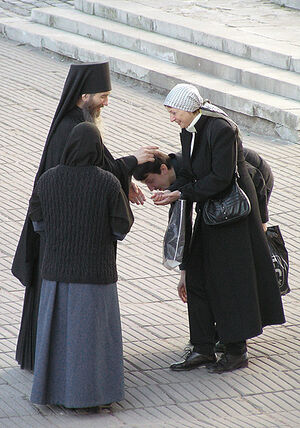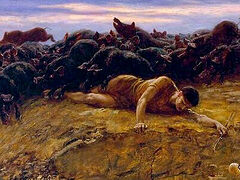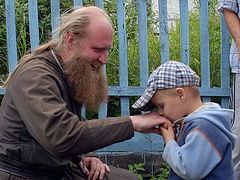 In sending His Disciples and Apostles to preach the Gospel, our Lord Jesus Christ gave them this command: “When you enter into some house or city, then say: ‘Peace to this house,’ or: ‘Peace to this city!’ If there is a man of peace there, that is, a man worthy of peace, then your peace will remain with you, and if not, then your peace will return to you.”
In sending His Disciples and Apostles to preach the Gospel, our Lord Jesus Christ gave them this command: “When you enter into some house or city, then say: ‘Peace to this house,’ or: ‘Peace to this city!’ If there is a man of peace there, that is, a man worthy of peace, then your peace will remain with you, and if not, then your peace will return to you.”
The Holy Apostles handed on such authority and rights to their successors—the bishops appointed by them. From these successors, their authority and right to transmit peace passes to all lawfully appointed bishops and the priests ordained by them to our day, as having received such authority and rights successively through the Holy Apostles from the Lord. And we, humble pastors and servants of your salvation say to you about the Lord: “Peace be upon you! May this peace of Christ be in your souls, and in your families, and in your society.” You always hear these words of peace in church from the pastors assigned to you. Every time a priest proclaims: “Peace be to all” or “The blessing of the Lord be upon you,” accept these words as the word of the Lord Himself, sending you peace and blessing by the mouth of the priest. If you accept these words of peace with faith, as from the Lord Himself, then this peace will abide with you. But if you accept them as simply words of benevolence that don’t actually give anything to the one who hears them, then you won’t receive this peace, that is, the peace of Christ; He will pass you by and stop at the one who desires it, who is worthy of it.
What does this peace, or blessing given us by our pastors mean? It’s not an empty sound, not a simple gust of the wind; no—it contains the power of God. This power can’t be seen with the eyes or felt with the hands. It can’t be weighed or measured; but it undoubtedly lies in the word, just as healing power lies in healing plants and other substances. As the healing power of a plant can’t be seen, felt, or weighed, but it’s revealed through its work on the human body, so the power of a blessing lies in the word and is revealed by how it works on a man. The power of a blessing is a creative force—it creates, it animates. At the beginning of the universe, everything was created by the word of God, and the Lord spoke His blessing to every one of His creations; there was life in this blessing. By this blessing, everything began to grow and multiply. While God’s blessing rested on earth and on the people, the people were blissful, and there was Paradise on earth. But when the curse was pronounced on the earth in the works of man because of his sin, then it began to bring forth thistles and thorns to him.
The Lord also gave such power to the human word. It’s good for that man whom the people bless for his goodness—he feels the power of this blessing with his soul. But woe to the man who will be cursed.
The Lord gave a special power of blessing to the words of some people. Thus, Holy Scripture talks about one man, a certain Balaam, who blessed a man and there was a blessing upon him that was expressed by success in deeds. But when Balaam cursed someone, whomever his cursing fell upon would become an unfortunate soul. The Lord also granted such power of blessing to parents in relation to their children. Thus, Noah blessed his sons Shem and Japheth, and they and their descendants were happy and ruled over other peoples; but the son of Ham whom he cursed, Canaan, with his descendants, was a slave of his brothers and their descendants. The Canaanites, the descendants of Ham, were given over to annihilation. The Egyptians, also a people of Ham, were subjected to God’s punishment and then remained ever in slavery to other peoples. Therefore, it’s not in vain that Divine Scripture says that the blessing of the father establisheth the houses of children; but the curse of the mother rooteth out foundations (Sir. 3:9).
It's no wonder that we developed the folk saying that with a parent’s blessing, you won’t burn in fire or drown in water.
If the blessing of some people had such power, if a parental blessing makes children happy, and a curse—unhappy, then what can we say about the blessing of a bishop or a priest, who received in succession from the Lord through the Apostles such authority as has no superior on earth. Although a priest doesn’t have the rights granted to earthly authorities—he has no authority over the body: he doesn’t deprive the guilty of earthly rights, doesn’t confiscate property, doesn’t bind, doesn’t imprison—he does have authority over the soul, and can deprive a man of his rights to the Heavenly inheritance; for the Lord said to the Apostles, and through them to bishops and priests: Whatsoever ye shall loose on earth shall be loosed in Heaven (Mt. 18:18). That means that if a priest binds anyone on earth, he will be bound in Heaven; and those bound will not be allowed into Paradise—his place is in the dungeons of hell. But when a priest looses a sinner in the name of Christ and tells him: “I forgive you and release you from your sins,” then the sinner will be loosed in Heaven, that is, he will receive free passage into the Heavenly abodes.
Such power is given only to priests, not only to the righteous, but also to sinners, sometimes very humble and weak in appearance.
So, there is great power within the words of a blessing. Great is the power of a parental blessing, but it extends only to their children. But a priestly or hierarchical blessing extends to everyone who receives it with faith. If that is so, then with what reverence must we relate to these humble bearers of authority and how ought we to value their blessings. Thus, fear God and honor His priest. Honour thy father and mother both in word and deed, that a blessing may come upon thee from them. For the blessing of the father establisheth the houses of children; but the curse of the mother rooteth out foundations (Sir. 3:8-9).






